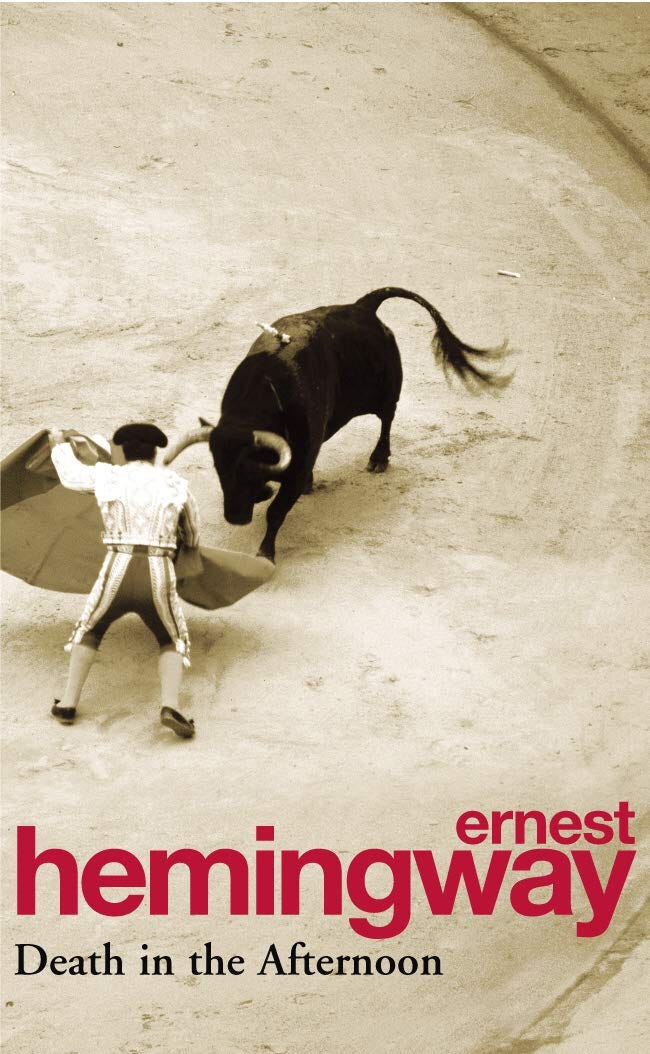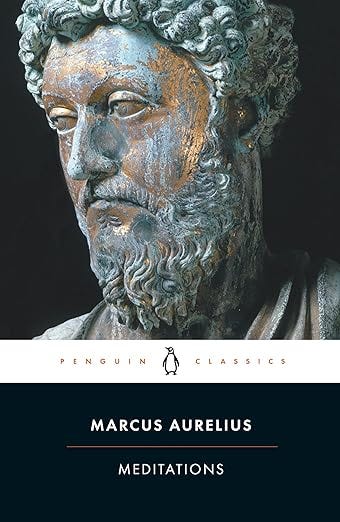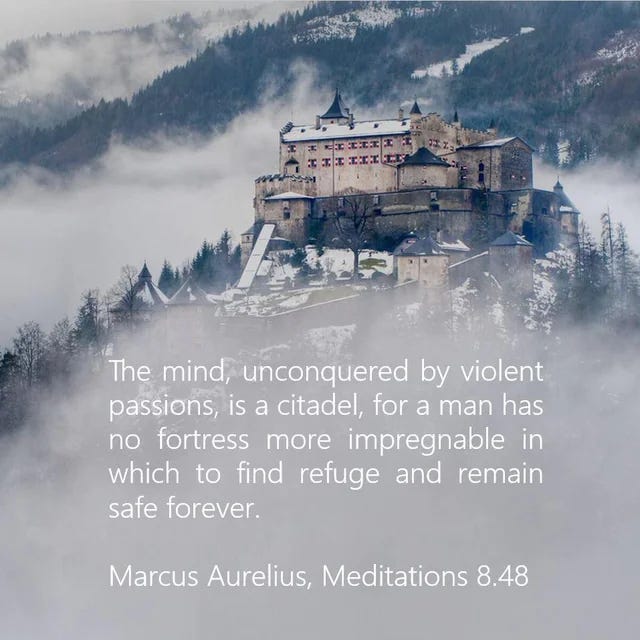I can think of two books that, after reading them, I was never the same.
These two books are Death in the Afternoon and Meditations.
Perhaps I might not be able to explain exactly why they have, as sometimes it can seem hard to be truly self-reflective, but I hope that with this short piece, I can give some kind of explanation.
Often, people in the business space find it easy to pick a book like Dotcom Secrets by Russell Brunson or Atomic Habits by James Clear as an example of a book that changed how they think. These books make good clickbait titles, good selling points, and ‘actionable’ tips – essentially, steps you can take straight after reading them. These books are often marketing materials in themselves.
However, neither of these books changed anything for me; they seemingly only added more information. Nothing within them changed the structure of my thinking at the root, and none of them changed any beliefs I held.
But the two books I am about to speak about did exactly these things.
Book One: Death in the Afternoon
Death in the Afternoon is a non-fiction book about bullfighting. Ernest Hemingway was famously passionate about bullfighting in Spain, and several of his books are centred around Spain and the bullfights. This was his treatise on the sport.
This book was his account of everything to do with the bullfights, from the way the stadiums are set up, the best seats to get, how the bulls are prepared, how the fighters are trained, how the fight goes, the ‘correct’ way to finish the fight, the etiquette within the fights – quite literally everything.
I did not expect to like this book so much, which is a direct mirror to how Hemingway begins the book, not expecting to enjoy bullfighting.
What surprised me even on the first page is that the controversy and distaste for the cruelty of bullfighting is nothing new. In the 1920s, despite the wide popularity of bullfighting in Spain, there was still a huge distaste for many of the same reasons as today, particularly from neighbouring countries such as England and France.
Hemingway himself did not expect to like it, but he quickly speaks about the effect it has on him.
So I went to Spain to see bullfights and to try to write about them for myself. I thought they would be simple and barbarous and cruel and that I would not like them, but that I would see certain definite action which would give me the feeling of life and death that I was working for.
I found the definite action; but the bullfight was so far from simple and I liked it so much that it was much too complicated for my then equipment for writing to deal with and, aside from four very short sketches, I was not able to write anything about it for five years — and I wish I would have waited ten.
His unexpected love for the bullfights was an immediate hook for me, and what follows is a structured and detailed description of every detail of bullfighting.
He describes the literal chronology of a fight, from the breeding and preparation of the bulls, the training of the matadors and picadors, the selling of the fights, the stadiums – all the way to the fight itself, the specific moves, and the styles which are considered the bravest, and those considered cowardly or cynical.
“It is not enough of a book”
Chapter 20, the final chapter, left a real impression on me.
After everything, all the long descriptions, Hemingway ends the novel by expressing anguish that he did not, or could not, say enough:
"If I could have made enough of this book, it would have everything in it"
Despite speaking about bullfighting in every detail that you could imagine, it still wasn’t enough, and perhaps it could never be enough.
He adds details of memories he has of attending the fights, and all the life behind them:
There is nothing in this book about Francisco Gomez, Aldeano, who worked in Ohio in a steel plant and came home to be a matador and now is scarred and marked worse than anyone except Freg, his eye twisted so a tear runs down his nose. Nor Gavira dead at the very instant as the bull with the same cornada that killed El Espartero.
Nor does it tell about Zaragossa, at night on the bridge watching the Ebro, and the parachute jumper the next day and Rafael's cigars; nor the jota contests in the old red plush theatre and the wonderful boy and girl pairs; nor when they killed the Noy de Sucre in Barcelona, nor about any of that; nor anything about Navarra; nor about the lousy town Leon is; nor about lying with a muscle torn in a hotel on the sunny side of the street in Palencia when it was hot and you do not know what hot is when you have not been there; nor on the road where dust is deeper than the hubs between Requena and Madrid; nor when it was one hundred and twenty in the shade in Aragon and the car, with no carbon nor anything wrong, would boil the water out of the radiator in fifteen miles on a level road.
He hammers this home with the final lines of the book:
"No. It is not enough of a book, but still, there were a few things to be said. There were a few practical things to be said."
The pain of a passion
Despite every line being about bullfighting, to me, this book is not about bullfighting; it is about Hemingway and his obsession.
This book was an attempt to explain the depth of a passion.
This ending demonstrates perfectly the pain of having a passion, specifically the pain that you will never know the passion in its entirety – you will never ‘complete’ said passion.
Perhaps another point is that a passion is rooted in pain in itself. It is no secret that Hemingway was deeply troubled. I wonder if only people who are troubled find passions in such a depth, as it is the medicinal nature of the passion which makes them so deep.
Nietschze described in Man Alone with Himself that you are either one of two people.
A person must have one or the other. Either a disposition which is easygoing by nature, or else a disposition eased by art and knowledge.
How this book changed how I think
I thought nothing could change my mind, but this book reminded me that my mind can always be changed.
I was able to realise that a passion seems painful because of its limitless nature.
I discovered the concept of ‘aficion’ and could understand how a taste develops for something to the point where it seems bizarre or distasteful to a regular person.
My only aim now is to achieve a similar level of obsession.
Book Two: Meditations
Meditations is a book written by Marcus Aurelius, a Roman emperor.
It is a series of small quotes or ‘aphorisms’ that are his reflections on philosophy, nature and spiritual reflections.
What is so fascinating about this book is that it was simply the diary of Aurelius, and had no intention of being published.
Something intended as a personal diary is now one of the foundations of the Stoicism philosophy.
I have also read On the Shortness of Life and Enchiridion, but still, to me, Meditations is the best by far, both from an enjoyment and academic perspective. Stoicism is a deeply personal journey and about inner reflection, the format of it being a personal diary seems fitting.
The power of the mind
What Meditations highlights first of all is the power of the mind.
This power of the mind comes from the development of self-control by abstaining from vices and anything that is not in accordance with nature.
Once this is understood, the mind can achieve strength in its most natural state.
"The mind, unconquered by violent passions, is a citadel, for a man has no fortress more impregnable in which to find refuge and remain safe forever.”
A different translation of Meditations goes into more depth on this line:
"Remember that your directing mind becomes invincible when it withdraws into its own self-sufficiency, not doing anything it does not wish to do, even if its position is unreasonable. How much more, then, when the judgement it forms is reasoned and deliberate? That is why a mind free from passions is a fortress: people have no stronger place of retreat, and someone taking refuge here is then impregnable. Anyone who has not seen this is short of wisdom: anyone who has seen it and does not take refuge is short of fortune."
He goes deeper and provides advice to himself in hard times.
“Don’t let your imagination be crushed by life as a whole. Don’t try to picture everything bad that could possibly happen.
Stick with the situation at hand, and ask, ‘Why is this so unbearable? Why can’t I endure it?’ You’ll be embarrassed to answer.”
The book also demonstrates that nature is the fuel to the power of the mind, as it is the ultimate demonstration that our time on this earth is short.
“Observe the movements of the stars as if you were running their courses with them, and let your mind constantly dwell on the changes of the elements into each other. Such imaginings wash away the filth of life on the ground.”
The ‘filth of life on the ground’ I think about often too. Whenever there is some petty problem or something that bothers me, this quote helps me remember that in the grand scheme of things, nothing really matters.
How this book changed how I think
I could and might write an entire essay about how this book has changed how I think, but I will try to keep it as brief as possible.
A fundamental tenet of Meditations and Stoicism is that "all is as thinking makes it so" and that the more you fall to "the puppet strings of impulse", the more you lose control over yourself.
You have power over your mind – not outside events. Realise this, and you will find strength.
What this book taught me is that the mind can be impenetrable, why discipline is everything, and the true shortness of life. Aurelius often talks about even the greatest historical figures being buried in the sands of time, soon to be forgotten.
The book emphasises that life is fleeting, humanity is insignificant, and only in understanding the shortness of life will you live without fear.
How many with whom I came into the world with have already left!
All the changes in my own life
These two books are now a foundation for my thinking.
In the last two years, the time I have read these books, there have been huge and complex changes in my life, most of them very positive.
But with such changes, the mind often has trouble catching up, and the doubts creep in, about whether you are doing what you are meant to be doing, and it can be difficult to define yourself, or know what kind of person you are.
These two books have given me solace.
Death in the Afternoon helped me understand why I was obsessed with certain things, and that it was okay to be obsessive. It made me realise the beauty of a passion, and of the work I need to do for a passion. It gave me inspiration to think about the depth of many of my own passions.
Meditations helped me realise that being disciplined and thinking about nature and higher powers is an immediate path to a calm mind. I would read it on the Overground at 6:30am on the way to training, slightly worried about the pain, slightly worried about the exhaustion, but then I would remember “you are a soul carrying a corpse” or “why can’t I endure this? You’ll be embarrassed to answer”. Immediately I would feel calm.
New ideas are always necessary, both as a writer and an entrepreneur. Finding endless pockets of inspiration is tough, and you need to give time to yourself to make sure you fill your cup when necessary.








Thank you!
I enjoyed reading your analysis and reactions.
Personally, I would much prefer Meditations but we are all on a journey of experience and testing whereby honesty and authenticity are crucial.
Wishing you well.